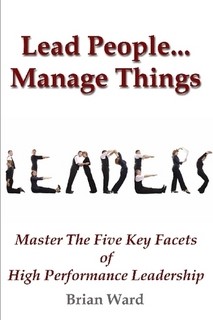What makes a good or even a great leader?
Many people in leadership positions struggle with understanding what makes a good or even great leader. While billions of dollars are spent annually on leadership development, quality leadership is still in short supply.
Organizations have responded to the demand for effective leadership with a steady stream of education and training resources, which seem to be plentiful, (for example, at the time of writing, Amazon.com had over 9,000 references on leadership), yet most attempts at building high-performance leadership are either far too complex or too simplistic to be of any practical use to leaders who need to make things happen. So what does work?
While successful organizations focus on three imperatives: aligning strategy & people; developing world-class leaders; and building world-class teams, when we look at what successful leaders personally do to succeed, we find that they concentrate on building their capacity around what we call five key facets of leadership:
Focus – Authenticity – Courage – Empathy – Timing
Focus
Effective leaders stay focused on the outcomes they wish to create and don’t get too married to the methods used to achieve them. They provide this ‘outcomes focus’ for their organization by emphasizing the mission, vision, values and strategic goals of their organization and at the same time building the capacity of their organizations to achieve them.
This capacity-building emphasizes the need to be flexible, creative and innovative and avoid becoming fossilized through the adoption of bureaucratic structures, policies, and processes. It also means letting go of lines of business, products, and programs that don’t support the focus.
Authenticity
Leaders who are authentic attract followers, even leaders who are viewed as being highly driven and often difficult to work for. Simply put, they are viewed as always being themselves.and therefore followers know what to expect from them and can rely on them, come thick or thin.
Authenticity provides the leader with the currency to obtain ‘buy-in’ from key stakeholders, because it builds and maintains trust. Authenticity is the bedrock upon which the other facets are built.
Courage
The challenges facing leaders today are immense and require great courage to overcome. Leaders are constantly being challenged by others, be it their own team, customers, the public or stakeholders. Standing firm in the face of criticism, yet having the courage to admit when they are wrong, are hallmarks of courageous leaders.
Also, shifting an organization from being introspective to becoming customer-focused requires courage when people pay lip service to the new direction…it means calling people on their bluff.
Empathy
Effective leaders know how to listen empathetically. thus legitimizing others’ input. By doing so, they promote consensus building and build strong teams. They coach others to do the same, and so create a culture of inclusiveness. They tend to be great listeners who capitalize on the ideas of others and provide recognition for these ideas, yet they don’t get bogged down in overly complicated dialogue.
While they create learning organizations that place a high value on dialogue and continuous feedback, they know when to take action, when to ‘fish or cut bait’, which brings us on to the fifth facet…
Timing
The one facet that can make or break a leader is in knowing when to make critical decisions and when not to. All of the other facets must be viewed as subservient to getting the timing of critical decisions and actions right. There is a need to be focused, authentic, courageous and empathetic, but get the timing wrong on critical decisions and everything else stands to be nullified.
Great leaders move with appropriate speed. They don’t believe that everything must be done immediately…they know how to prioritize, and how to get their team to prioritize. As well, they engage in timely follow-through to ensure actions that are committed to happen in a well-coordinated and timely way.
Is that all it takes to be a great leader? These facets of high-performance leadership are not exhaustive. Just as one would look at the facets of a diamond, upon closer observation other facets become observable.
Any person can aspire to be a great leader by starting with these facets. If you are in a leadership role, regardless of your position in your organization, start by asking yourself the following key questions:
Key Questions
1. How focused am I? How much of my time do I spend communicating and inspiring people about our mission, vision and strategic goals? How much focus do I create in my organization? How married am I/my organization to methods that have outlived their usefulness?
2. Am I viewed as authentic? Do people see and hear the real me? Do I wear a mask at work, and remove it when I leave each evening?
3. How courageous am I when my values, vision, and goals are challenged? Do I stand firm and only change my position when I know that I am wrong?
4. How empathetic am I? Too much/too little? Do I create enough opportunities for open and candid dialogue? Do I ever find myself getting bogged down in consensus building, or leading my team to false consensus? Is there a feeling of inclusiveness and engagement amongst the members of my organization, and with other stakeholders, including customers?
5. Do I make and execute decisions in a timely fashion? Do I know when to ‘fish or cut bait?’ – do I demand well-coordinated and timely execution of strategy from others?
What can you do to create a high-performance leadership culture? Asking these questions in a candid way will open up many possibilities for you, your organization or your clients…if you have the courage to do it. Building and sustaining a high-performance leadership culture takes time, patience and a clear focus on the vital few characteristics that leaders can develop naturally and authentically.
Listening to what people expect from you as a leader, and then responding empathically, in a timely fashion, will move you dramatically towards mastering these five key facets of high-performance leadership.
Above all, you need to TAKE ACTION.
About the Author
Brian Ward is co-founder and CEO of Affinity Consulting and Training. Based in Edmonton, Alberta he provides leadership and management development to organizations in the private and public sectors throughout Canada.
Receive a free downloadable copy of his book Lead People…Manage Things: Master The Five Key Facets of High-Performance Leadership when you subscribe to his weekly newsletter Monday Morning Mentor.









.png)



